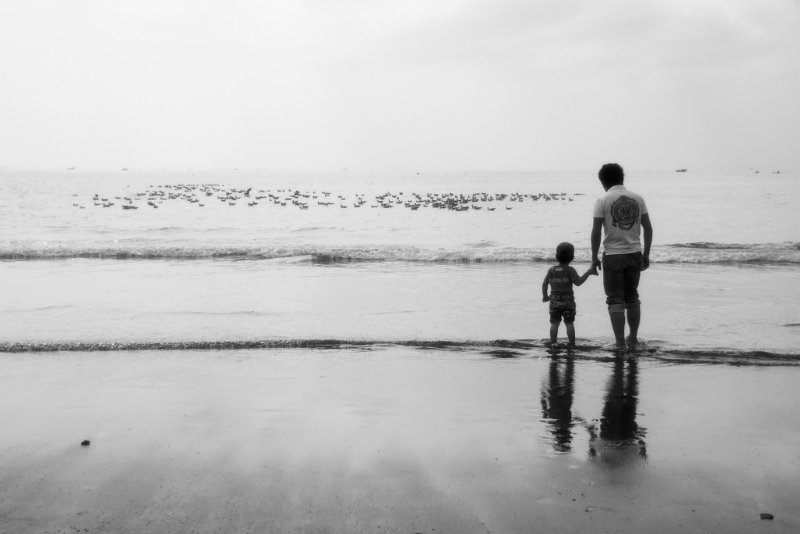One day, when I was in high school, a few friends came over to my house, and my dad offered to take us out for ice cream. Heading to Baskin Robins a couple blocks away, my friends and I walked ahead of my dad, ordered the cones and paid for them. By the time my dad walked in, he was taken aback, and in a minor fit of trivial furiousity, probably didn’t mean to yell, but kinda did yell: “I wanted to buy you ice cream!”
It’s become a recurring joke among my friends ever since – the kind of line one might abruptly shout in casual conversation whenever someone nearby mentions ice cream – but my dad, whenever he’s reminded of it, denies he was angry.
“I didn’t yell,” he’ll say. “I just wanted to buy you ice cream.”
Jewish fathers don’t have a great rep in pop culture. They’re either stiffly controlling (as Tevye famously laments in Fiddler on the Roof, “If I try and bend that far, I’ll break”) or as goofy sidekicks to the nagging mother (from Woody Allen’s father figure in Radio Days: “Wait-a-minute: are you telling me you think the Atlantic is a better ocean than the Pacific?”).
They always know the right way to do things – their way – and tend to be lampooned for it, by their kids and wives, when all they’re really trying to do is make everyone happy by any means necessary. They’re not angry, they just wanted to buy us ice cream!
Meanwhile, the stereotypical Jewish mother gets no shortage of coverage – the nagging, the kvetching, the passive aggression, the food-pushing. But Jewish fathers get less attention. It’s uncommon to see our papas portrayed as fragile humans of equal parts comedy, wisdom and insecurity; there is an aloofness about them in literature and film, a staunchly high chin that is ripe for antagonism and farce.
READ: THE JEWISH COMIC WHOSE FATHER TOLD HIM ‘JOY DOESN’T EXIST’
And so we turn to Noah Baumbach, preeminent portrayer of Jewish fathers, whose latest film, The Meyerowitz Stories (New and Selected), is a quasi–spiritual sequel to his breakout 2005 feature, The Squid and the Whale. Both works deal with a dominant, difficult father suddenly reflecting on his place in a confusing family – but in this new film, the patriarch, Harold (a brilliant Dustin Hoffman), is far more cocksure, and far more hilarious.
The Meyerowitz Stories, which debuted on Netflix mid-October, is Baumbach’s most gripping film yet. It’s a vibrant patchwork of loose family ties, half-sibling rivalries and failed marriages. Stylistically, it’s sophisticated and edgy; plot-wise, there isn’t much, and it doesn’t matter. It involves a reunion of three siblings – played excellently by Adam Sandler, Ben Stiller and Elizabeth Marvel – centred around a showcase of their father’s art.
The film is deeply personal for Baumbach, whose actual grandfather (also named Harold) was an artist who never achieved real fame. Baumbach’s father found a similar fate with experimental fiction. But his mother was Protestant – a fact that, I suspect, honed Baumbach’s years-long focus on what it means and looks like to be a Jewish father.
This naturalism helps the film transcends typical dysfunctional-family tropes. “I don’t really think of it in terms of dysfunction – it’s just family,” Baumbach told the Hollywood Reporter at the Cannes Film Festival. “Families are all versions of the same person.”
That’s particularly true with the film’s other dad, Danny (Sandler). Danny swears at a billiard table seconds before Harold does. They hobble-run down the street together. They’re inversions of fatherhood: Harold felt like he failed with Danny, while Danny worries about failing his daughter. They’re both bundles of neuroses, channeled through a guise of control.
In the film’s opening scene, Danny loses his temper while searching for a Manhattan parking spot. When his daughter suggests a garage, he balks at the cost. When she offers to pay half, he dismisses her. “I’m not taking your money,” he says.
Or, as my father might say, “I wanted to buy you ice cream!”
